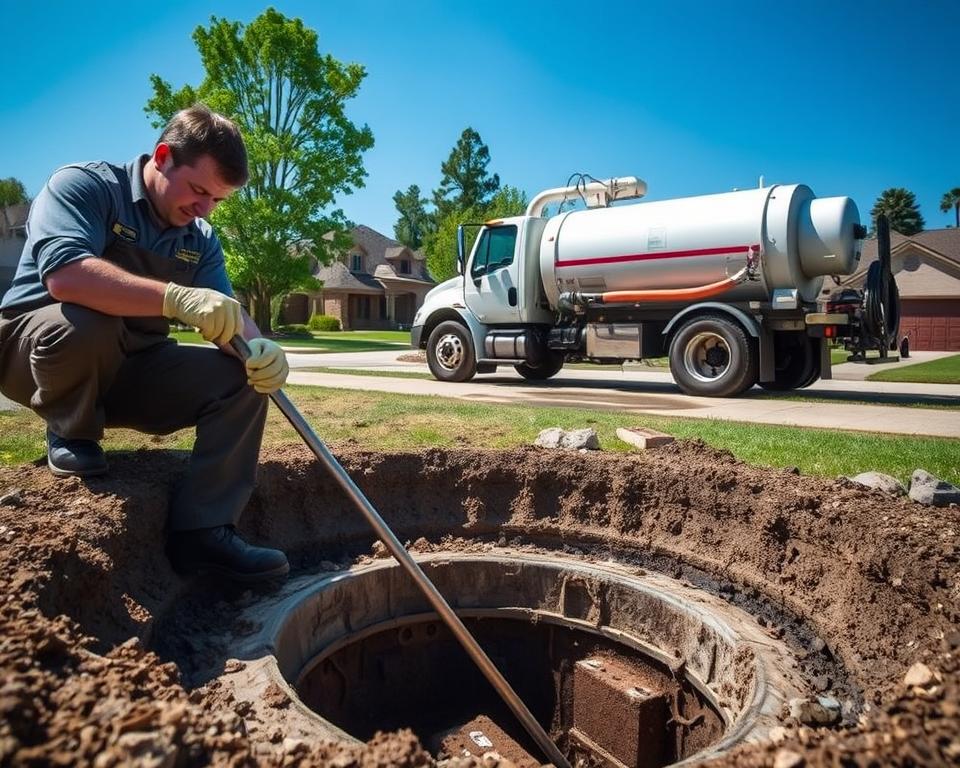Sustain Septic System Cleaning for Tank Health
Do you ever wondered concerning the effects of ignoring septic system care? When you depend on these installations for wastewater treatment, missing regular care can cause significant bills. It also creates risks to both public safety and the environment. Servicing your septic system isn’t just a basic task; it’s essential for guaranteeing your household functions efficiently. By routinely clearing out your septic tank, you prevent solid waste build‑up and lengthen the service life of your system. This proactive approach helps you sidestep any unwanted situations. Discover the importance of septic tank maintenance and the methods required with septic system inspection.
Core Messages
- Routine septic system cleaning is vital for warding off costly repairs.
- Ignoring maintenance can result in dangerous conditions for your family.
- Comprehending your septic system aids in effective care.
- Symptoms of a malfunctioning septic system should be identified quickly.
- Professional technicians can help in preserving excellent tank health.
Comprehending Your Septic System
A septic system is an effective on‑property approach for handling wastewater. It mainly comprises two parts: the septic tank and the absorption field. Both are integral for delivering safe treatment and protecting the surroundings.
The septic tank receives wastewater from your home. There, solid particles drop to the base, and fluids rise to the top. Bacteria within the tank decompose the organics, making the liquid waste more manageable to process. This pre‑treated wastewater then flows to the drainfield for further purification by the earth, concluding the cycle.
It’s crucial for homeowners to appreciate the mechanics of their septic system. Grasping how the septic tank and drainfield operate together can lead to better system care. This insight supports proper maintenance practices, helping guarantee the system’s robustness.

Value of Regular Septic System Cleaning
Routine maintenance of the septic system is key for home and environmental health. If neglected, unprocessed wastewater can seep into your yard. This overflow can cause subsurface water contamination, posing health hazards. By keeping the septic system clean, you safeguard your household and the ecosystem.
It’s recommended to clean the septic system every three‑to‑five years, according to how much you rely on it. Such maintenance is not just eco‑friendly; it heads off big bills. A septic system that’s well‑maintained operates more reliably, delivering a safer household and a healthier natural world.
Indicators Your Septic Tank Needs Service
Homeowners need to identify signals that their septic tank may need servicing. Key signals to monitor consist of:
- Sluggish drainage in basins, bathtubs, and lavatories
- Unpleasant stenches near the drainfield
- Sewage backups in indoor pipes
- Persistent soggy spots or lush patches of grass over the septic system
It’s critical to identify these warnings quickly to avoid serious septic tank issues. Regular inspections are essential. They help spot issues before they become costly fixes. Examining your system consistently ensures it functions well and survives longer.
Keeping watch and acting swiftly are crucial for septic system upkeep. By monitoring these alerts, you can preserve your septic system in prime condition.
Septic System Pumping Schedule
Servicing your septic system on schedule is central to maintaining your home’s plumbing in top shape. Specialists usually advise pumping the septic tank every three to five years. However, this can change according to the capacity of your household, how much water is consumed, and the capacity of your tank.
If you have a larger household that consumes more water, you might need to pump the system more often. Tracking your water consumption can let you determine if you need to revise your service schedule.
All in Sanitation recommends setting up a reliable pumping schedule that suits your household’s unique needs. Adhering to a routine maintenance program helps keep your septic system operating efficiently and prevents costly restorations.
Septic System Cleaning: Top Tips
For a septic system to remain healthy, homeowners must observe key guidelines. It’s vital not to dispose of non‑biodegradable items; doing so stops clogs and maintains the system functioning properly. Similarly, limiting household chemical usage helps maintain the essential bacterial population. These measures are critical for the system’s life span and efficiency.
Taking initiative with scheduled inspections is crucial. Scheduling regular assessments can detect issues quickly, allowing for swift fixes. Additionally, conserving water through repairing drips and mindful usage aids septic tank health. These practices ensure the system runs effectively for decades.
It’s also essential not to place heavy loads on the leachfield. Maintaining this area clear lets it effectively process waste water, protecting your system from issues. Listening to advice from experts like All in Sanitation also improves septic system care.
The Steps of Septic Tank Pumping
For homeowners, grasping the septic system cleaning process is key. A licensed septic pumper should handle scheduled septic tank pumping to keep your system functioning efficiently. The first step is assessing the tank’s status to decide when it needs pumping.
A septic tank demands pumping once the solid layer occupy about 1/3 to 50 percent of its volume. The licensed septic pumper will then clear out these accumulations. This procedure maintains the system’s performance. Furthermore, the visit may entail checking the tank for incipient issues, allowing for quick fixes.
Maintaining a journal of each pumping visit is wise. This log enables you to monitor their septic system’s service history, and is helpful if selling the property. Proper septic system maintenance extends its life span and performance, averting hefty fixes later on.
Septic Tank Inspection: What to Watch For
Routine inspections are crucial for your septic system’s health. Using a detailed septic tank inspection checklist can uncover potential issues before they worsen. Inspections should be done by a certified professional every 1‑2 years. They will gauge sludge levels and the scum layer’s condition during this time.
Checking the baffles and outflow filters is also vital. These parts are critical for your septic system’s smooth function. Spotting drips or issues early can prevent large repair costs. Preventive measures, like following an inspection checklist, enhance your system’s lifespan and effectiveness.
Professional Septic System Services
Engaging professional septic system services is vital for your septic system’s health. By partnering with a company like All in Sanitation, you ensure that experts take care of the cleaning, inspections, and repairs carefully. Accredited technicians carry specialized knowledge, enabling homeowners to maintain the system’s best functionality for decades.
Upkeep by certified technicians cuts the chance of surprise breakdowns and costly repairs. These services feature comprehensive inspections that evaluate the system’s condition, pinpointing incipient problems before they escalate. Maintaining this forward‑looking posture greatly prolongs your septic system’s life.
Ultimately, entrusting your septic system to qualified experts offers reassurance. Working alongside companies such as All in Sanitation leverages their know‑how. It guarantees the integrity of your tank, fostering assurance in its maintenance.
Septic System Maintenance Hints for Homeowners
Homeowners have the capacity to maintain their septic systems functioning reliably. Using efficient care hints markedly boosts their performance. Implementing simple changes to water habits, like cutting down on unnecessary use and staggering the use of appliances, decreases strain on the system.
Adding water‑saving faucets in your bathrooms and kitchens greatly bolsters septic health. These fixtures lower water use without compromising functionality. Avoiding garbage disposals is wise too, as they cause more solids in the system, necessitating more frequent upkeep.
Regular inspections and following a proper maintenance schedule will prolong your septic system’s lifespan. Staying aware of everything that goes down your drains is key for preserving a healthy septic environment. By adopting these tips, you’ll immensely support your septic system’s operation and longevity.
Common Septic System Repairs
Septic systems may encounter various problems over time, requiring repairs. Frequent problems are fluid loss, faulty baffles, and flow problems in the drainfield. By recognizing the signs early, homeowners can address them quickly, keeping their system stays in solid condition.
Typical repairs include:
- Replacing faulty components to bring back system integrity
- Fixing or replacing damaged pipes to prevent leaks
- Clearing blocked pipes to ensure proper drainage
Addressing septic troubles swiftly not only reduces costs over time but also prolongs the system’s life. Regular check‑ups and maintenance can help prevent these problems, aiding in the maintenance of a robust septic system.
As a Final Point
Maintaining your septic system healthy is central to environmental and family well‑being. Routine services and check‑ups avoid costly fixes and dangers. Taking initiative with septic care protects money and lowers concern.
Using professionals like All in Sanitation ensures high‑quality upkeep suited to your needs. Their knowledge assists detect issues quickly, preventing serious troubles and underscoring the need for regular inspections.
Adopting effective habits for septic maintenance delivers long‑term system effectiveness. A bit of maintenance in the present secures a more reliable septic system in the years ahead.

